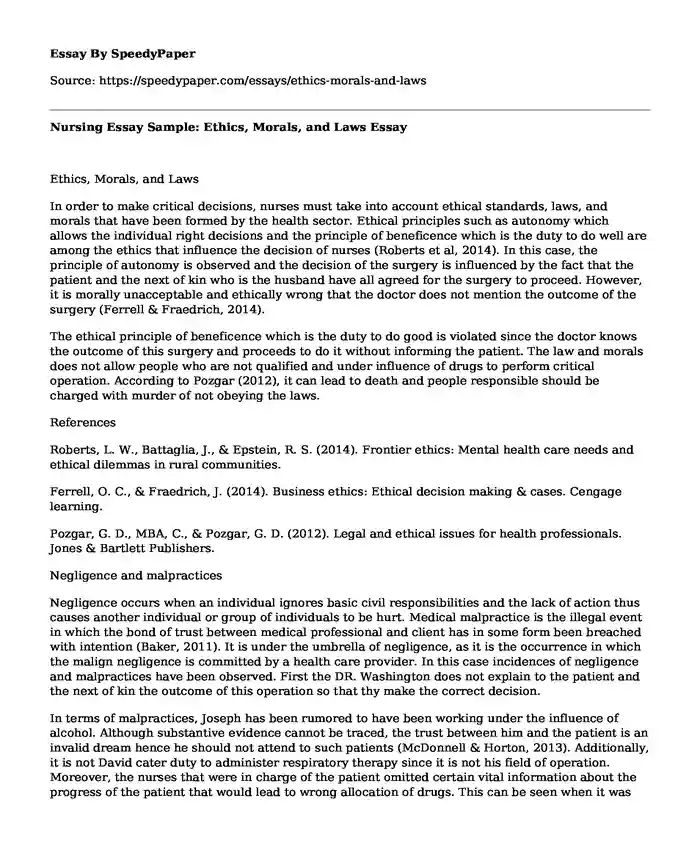Ethics, Morals, and Laws
In order to make critical decisions, nurses must take into account ethical standards, laws, and morals that have been formed by the health sector. Ethical principles such as autonomy which allows the individual right decisions and the principle of beneficence which is the duty to do well are among the ethics that influence the decision of nurses (Roberts et al, 2014). In this case, the principle of autonomy is observed and the decision of the surgery is influenced by the fact that the patient and the next of kin who is the husband have all agreed for the surgery to proceed. However, it is morally unacceptable and ethically wrong that the doctor does not mention the outcome of the surgery (Ferrell & Fraedrich, 2014).
The ethical principle of beneficence which is the duty to do good is violated since the doctor knows the outcome of this surgery and proceeds to do it without informing the patient. The law and morals does not allow people who are not qualified and under influence of drugs to perform critical operation. According to Pozgar (2012), it can lead to death and people responsible should be charged with murder of not obeying the laws.
References
Roberts, L. W., Battaglia, J., & Epstein, R. S. (2014). Frontier ethics: Mental health care needs and ethical dilemmas in rural communities.
Ferrell, O. C., & Fraedrich, J. (2014). Business ethics: Ethical decision making & cases. Cengage learning.
Pozgar, G. D., MBA, C., & Pozgar, G. D. (2012). Legal and ethical issues for health professionals. Jones & Bartlett Publishers.
Negligence and malpractices
Negligence occurs when an individual ignores basic civil responsibilities and the lack of action thus causes another individual or group of individuals to be hurt. Medical malpractice is the illegal event in which the bond of trust between medical professional and client has in some form been breached with intention (Baker, 2011). It is under the umbrella of negligence, as it is the occurrence in which the malign negligence is committed by a health care provider. In this case incidences of negligence and malpractices have been observed. First the DR. Washington does not explain to the patient and the next of kin the outcome of this operation so that thy make the correct decision.
In terms of malpractices, Joseph has been rumored to have been working under the influence of alcohol. Although substantive evidence cannot be traced, the trust between him and the patient is an invalid dream hence he should not attend to such patients (McDonnell & Horton, 2013). Additionally, it is not David cater duty to administer respiratory therapy since it is not his field of operation. Moreover, the nurses that were in charge of the patient omitted certain vital information about the progress of the patient that would lead to wrong allocation of drugs. This can be seen when it was noted by Army and Susan in quality assurance manager.
References
Baker, T. (2011). The medical malpractice myth.
McDonnell, W. M., & Horton, J. R. (2013). When are hospitals liable for independent contractors negligence?. AAP News, 34(7), 18-18.
Waxman, D. A., Greenberg, M. D., Ridgely, M. S., Kellermann, A. L., & Heaton, P. (2014). The Effect of Malpractice Reform on Emergency Department Care. New England Journal of Medicine, 371(16), 1518-1525.
The Role of Stakeholders in Passing the Proposed Amendment
The current health care environment have a myriad of policies, laws, and regulations imposed by government agencies, private sector insurers, and institutions that are influenced by different stakeholders such as politicians, voters, activists, and lobbyists (Anderson, 2014). In a proposed amendment, politicians are imperative in that they approve it in the senate or in the parliament. They can also influence voters to vote against such amendments. A voter is an imperative person in a proposed amendment especially if the amendment has to be approved by the public.
They will decide whether the amendment can be effected by voting in support of such amendments. The activists will look at the amendment and convince people if it is beneficial or harmful to the community (Bell, 2015). The activist can go to the court to obstruct implementation of amendments that intend to oppress individuals. Lobbyist influence decisions made by officials in the government, most often legislators or members of regulatory agencies according to the importance and the effects the proposed amendment will assist individuals and the public as a whole (Campbell et al., 2012).
References
Anderson, J. E. (2014). Public policymaking. Cengage Learning.
Bell, E. (2015). The road to legislative freedom: analysis. TAXtalk, (50), 82-85.
Campbell, J. T., Campbell, T. C., Sirmon, D. G., Bierman, L., & Tuggle, C. S. (2012). Shareholder influence over director nomination via proxy access: Implications for agency conflict and stakeholder value. Strategic Management Journal, 33(12), 1431-1451.
Cite this page
Nursing Essay Sample: Ethics, Morals, and Laws. (2019, May 14). Retrieved from https://speedypaper.com/essays/ethics-morals-and-laws
Request Removal
If you are the original author of this essay and no longer wish to have it published on the SpeedyPaper website, please click below to request its removal:
- Free Essay: HSE in Drilling and Completion Operation
- Free Essay about History of Gun Control in America
- Education Essay Sample: Why I Deserve This Scholarship
- Essay Example: Reasons Why Donald Trump Should Never Be Elected President
- Essay Sample on Visual Merchandising and Display Techniques
- Free Essay Sample on Criminal Profiling
- Woman and Society: Essay Example on the Core Themes of The Awakening
Popular categories





